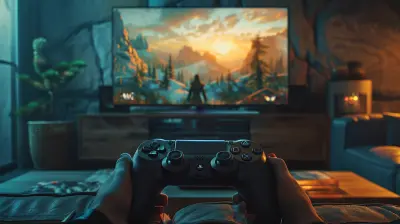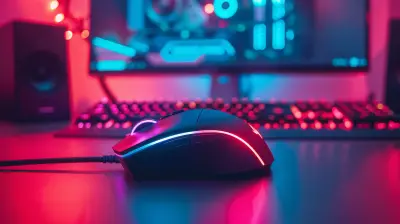The Psychology Behind Player Avatar Design Choices
8 April 2025
Have you ever spent way too much time designing your avatar in a game? Maybe you couldn't decide between that badass warrior look or something a little quirkier, like a wizard with a funky mustache. Trust me, you're not alone. Player avatar design is a creative playground, and believe it or not, the choices you make can reveal a lot about your personality, mood, and even how you want to be seen by others.
But why do we care so much about designing these little virtual versions of ourselves in the first place? Why does choosing the perfect hairstyle or armor color feel like such a big deal? Let’s dive into the psychology behind player avatar design choices and uncover why we pour so much of ourselves into these digital personas.![]()
The Avatar as a Digital "You"
When you think about it, avatars are like your virtual handshake. They speak volumes about who you are—or who you want to be—before you even say a word. Whether you're slaying dragons in a role-playing game (RPG) or just vibing at a cozy virtual cafe in The Sims, your avatar becomes an extension of yourself.Psychologists call this concept "identity expression." Simply put, your avatar allows you to express facets of your identity in a way you might not feel comfortable doing in the real world. For instance, someone who's typically shy might create a bold, flashy avatar to represent their inner confidence. Think of it like the digital version of dressing up for a costume party—you get to be whoever you want to be, no judgment.![]()
Self-Expression vs. Idealization: The Big Divide
When we create avatars, we often fall into one of two camps: self-expression or idealization. What’s the difference? Glad you asked.- Self-Expression: Some players use avatars to mirror their real-life selves. They’ll choose features that resemble their physical appearance—similar hairstyle, skin tone, or even glasses. Why? Because for these players, their avatar feels like "home." It provides a sense of continuity between their real-life and online selves.
- Idealization: On the other hand, some players see avatars as a chance to live out a fantasy. Want to be a seven-foot-tall elf with glowing eyes? Go for it! Prefer to roll through the game world looking like a futuristic robot decked out in neon lights? Done. These players use avatars to create a version of themselves that represents their aspirations, dreams, or alter-egos.
Neither approach is right or wrong, by the way. They’re just different ways we project parts of ourselves into a game world. Kind of like choosing between sweatpants and a tuxedo—both reflect your vibe, just in different contexts.![]()
Avatar Choices Are Influenced by Mood (Yep, Really)
Ever notice how your mood dictates what kind of avatar you design? Imagine you’ve had a stressful day. You might opt for a calm and peaceful-looking character, hoping it’ll help you unwind as you play. On the flip side, if you’re feeling adventurous and ready to conquer the world, you might pick that tanky barbarian with a giant axe.The same thing happens when it comes to color choices. Studies have shown that colors directly impact our emotions, and this carries over to avatar design. For example:
- Bright, bold colors (like red and yellow) often indicate excitement or power.
- Soft, neutral tones (think pastel blues or greens) tend to reflect a desire for calmness or tranquility.
- Dark, moody hues (black, deep purples) might signal mystery, rebellion, or even introspection.
So yeah, next time you find yourself obsessing over which shade of blue your character’s armor should be, just remember—it’s not just aesthetics. It’s psychology.![]()
Social Interaction: How We Want to Be Seen
Let’s be real. Part of the reason we spend hours perfecting our avatars is because we care—at least a little—about how other players perceive us. Whether you’re showing off your ultra-rare cosmetic skin in Fortnite or carefully designing a unique look in Animal Crossing, your avatar screams, “This is me!” to everyone you meet online.This ties into the concept of "social signaling." Essentially, your avatar becomes a virtual megaphone for what you want to convey to others. Want to signal that you’re a team player? You might go for a friendly, approachable design. More of a lone wolf? Maybe something edgy and mysterious.
Interestingly, this also explains the popularity of customization options like emotes or gestures in online games. You’re not just creating a visual representation of yourself—you’re designing a personality. It’s like choosing a dance move at a party; it’s not just about the dance, but what it says about you.
Gender and Avatar Design: Breaking Free from Norms
One fascinating aspect of avatar creation is how it lets us play with gender expression. In many games, players aren’t restricted by traditional gender norms. This flexibility allows people to create avatars that reflect their preferred gender identity, experiment with new ones, or even mix elements from multiple genders.For some, this is empowering. It’s a safe space to explore parts of themselves that they might not be able to express in real life. For others, it’s not that deep—it’s just fun to switch things up. Case in point: many male players enjoy creating and playing as female avatars, and vice versa. Why? Well, some players say female avatars get better cosmetic options (which… honestly, fair point). Others argue it’s simply more interesting or visually appealing to play as a character different from themselves.
The Role of Game Genre in Avatar Design
Not all games are created equal, and the same goes for their avatar customization options. A player’s choices are often influenced by the type of game they’re playing:- RPGs and MMOs: These games typically offer deep customization. Here, players often spend hours crafting avatars because these characters represent them in a vast, immersive world. Every detail—down to the eyebrow shape—feels important.
- Casual or Social Games: Think The Sims or Animal Crossing. Players in these games are focused more on self-expression and creativity than combat performance. Since these games are usually less competitive, avatar design often becomes more lighthearted and fun.
- Shooters and Action Games: In these genres, customization often takes a backseat to functionality. That cool-looking armor? It better also provide good stats. That said, cosmetic skins are HUGE in these games because they let players add a personal touch without affecting gameplay.
Why We Love Unlocking Customization Options
Let’s not forget one of the most satisfying parts of avatar creation: unlocking new outfits, accessories, or features throughout the game. Developers know we love to look cool, so they keep feeding us a steady stream of shiny new customization options.But why does this feel so rewarding? It all boils down to dopamine. Unlocking new gear triggers that little rush of happiness in our brains, similar to opening a gift. When our avatar looks cooler or more powerful, we feel like we’ve achieved something—even if it’s just snagging a rare helmet skin.
Think of it as dressing up action figures as a kid. The more outfits and accessories you had, the more epic the battles (or tea parties) could be.
Final Thoughts: It’s More Than Just Pixels
At the end of the day, player avatar design isn’t just about creating a cute or intimidating character. It’s about self-expression, personal identity, and even connecting with others. Whether you’re designing something that looks like you, or something totally out of this world, the choices you make are deeply personal—even if it’s just picking the right shade of “epic dragon purple.”So next time you’re obsessing over your avatar’s hairstyle or armor combo, just remember: it’s not just a character. It’s you—or at least, some version of you—and that’s pretty awesome.
all images in this post were generated using AI tools
Category:
Character CustomizationAuthor:

Tayla Warner
Discussion
rate this article
6 comments
Kane McDowell
Fascinating insights! Understanding avatar choices enhances player connection and enriches gaming experiences.
May 5, 2025 at 4:09 PM

Tayla Warner
Thank you! I'm glad you found the insights valuable—avatar choices truly play a crucial role in deepening player engagement.
Selene Hahn
This article adeptly explores the intricate psychological factors influencing player avatar design choices. By examining the interplay of identity, empowerment, and immersion, it highlights how avatars serve as extensions of self-expression, ultimately enhancing player engagement and emotional connection within gaming experiences. A compelling read!
April 18, 2025 at 2:58 PM

Tayla Warner
Thank you for your thoughtful feedback! I'm glad you found the exploration of identity and self-expression in avatar design compelling. Your insights on player engagement resonate with the core themes of the article!
Rhett McLaury
Who knew our avatars were basically mini-therapists? From fierce warriors to cuddly bunnies, it seems our design choices reveal more about us than our last therapy session ever could! 😂🎮
April 15, 2025 at 4:55 AM

Tayla Warner
Absolutely! Our avatar choices often reflect our inner selves and coping mechanisms, making them unique expressions of our personality. It's fascinating how gaming can serve as a mirror of our psyche! 🎮✨
Thompson
Avatar design reveals players' identity and aspirations profoundly.
April 13, 2025 at 3:46 PM

Tayla Warner
Thank you for your insight! Indeed, avatars serve as a powerful reflection of players' identities and aspirations, shaping their in-game experience and self-expression.
Juliet King
Exploring the psychology of player avatar design reveals deep connections between identity and gaming. Embrace the creativity and individuality that avatars offer, empowering us to express ourselves in vibrant new ways. Let’s celebrate the uniqueness each player brings to the game!
April 11, 2025 at 2:50 PM

Tayla Warner
Thank you for your insightful comment! I completely agree—player avatars are a powerful medium for self-expression and identity in gaming. Celebrating this individuality enhances the overall gaming experience.
Hope McFadden
Fascinating insights! It's intriguing how player avatars reflect personal identity and psychological preferences. I’m curious about how these choices might influence gameplay experience and community interactions. Can design further enhance emotional connections to the game world?
April 10, 2025 at 2:27 AM

Tayla Warner
Thank you for your thoughtful comment! Player avatars indeed play a crucial role in shaping gameplay experiences and community interactions. Thoughtful design can significantly enhance emotional connections, making players feel more immersed and invested in the game world.
MORE POSTS
Video Games as Art: Exploring the Intersection Between Pixels and Paint

Cross-Generation Console Games: What to Expect in the Future

Beyond the Horizon: Expansive Environments to Explore in the Best Sandbox Games

Silent Click Gaming Mice for Late-Night Sessions

How Stylized Games Are Defying Realism and Winning Over Players